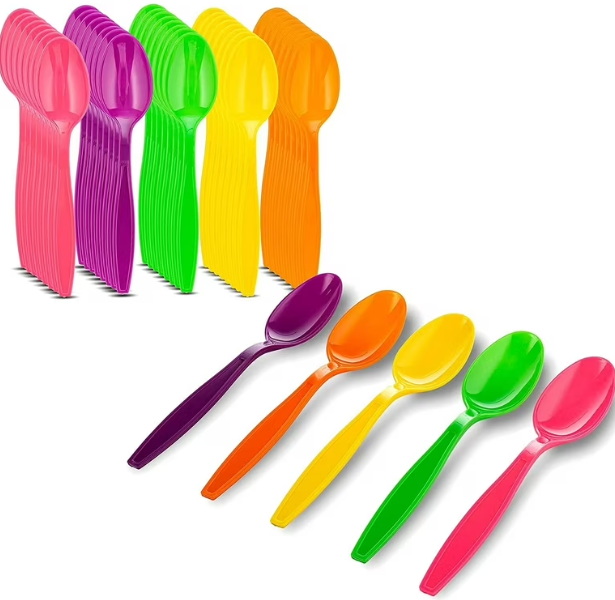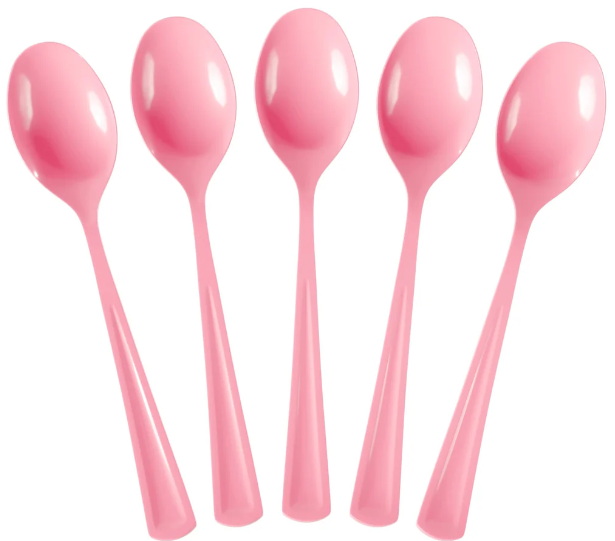
Content Menu
● Introduction to Disposable Spoon Manufacturers
>> Types of Disposable Spoons
● Key Factors to Consider When Choosing a Disposable Spoon Manufacturer
>> 1. Material and Sustainability
>> 2. Quality and Durability
>> 3. Cost and Budget Considerations
>> 4. Customization and Branding Options
>> 5. Supplier Reputation and Reviews
● Recommended Disposable Spoon Manufacturers
>> Plastic Disposable Spoon Manufacturers
>> Wooden Disposable Spoon Manufacturers
>> Bamboo Disposable Spoon Manufacturers
● Market Trends and Future Outlook
>> Innovations in Biodegradable Materials
>> Impact of Regulations on Disposable Spoon Manufacturing
● Strategies for Sustainable Supply Chain Management
>> 1. Source Materials Locally
>> 2. Implement Recycling Programs
>> 3. Monitor Supply Chain Transparency
● Conclusion
● FAQs
>> 1. What are the most eco-friendly disposable spoon options?
>> 2. How do I ensure the quality of disposable spoons from a manufacturer?
>> 3. Can I customize disposable spoons with my brand logo?
>> 4. What certifications should I look for in a disposable spoon manufacturer?
>> 5. How can I reduce costs when purchasing disposable spoons in bulk?
● Citations:
Choosing the right disposable spoon manufacturer for your business can be a daunting task, especially with the increasing demand for eco-friendly and sustainable products. This guide will walk you through the key factors to consider when selecting a disposable spoon manufacturer, ensuring that you find a supplier who meets your business needs while aligning with environmental values.

Introduction to Disposable Spoon Manufacturers
Disposable spoons are used in various industries, including food service, catering, and events. The choice of material—whether plastic, wood, bamboo, or biodegradable options—plays a crucial role in determining the environmental impact and cost-effectiveness of these spoons. Here, we'll explore different types of disposable spoon manufacturers and what to look for when making your selection.
Types of Disposable Spoons
1. Plastic Disposable Spoons: These are lightweight and inexpensive but contribute significantly to plastic pollution. They are made from materials like polystyrene or polypropylene and are not biodegradable. Despite their affordability, the environmental impact of plastic spoons has led many businesses to seek alternatives.
2. Wooden Disposable Spoons: Made from renewable wood sources, these spoons are biodegradable and offer a sustainable alternative to plastic. They are often used in upscale settings due to their premium appearance and are favored for their natural look and feel.
3. Bamboo Disposable Spoons: Bamboo is a highly renewable resource, making bamboo spoons an eco-friendly choice. They are durable and compostable, reducing environmental impact. Bamboo spoons are also lightweight and can be used for both hot and cold foods.
4. Biodegradable Disposable Spoons: These are made from materials like cornstarch or PLA and decompose faster than plastic. They require proper composting facilities to fully break down, making them a viable option for businesses with access to such facilities.
Key Factors to Consider When Choosing a Disposable Spoon Manufacturer
When selecting a disposable spoon manufacturer, several factors should be considered to ensure you find a supplier that meets your business needs and environmental standards.
1. Material and Sustainability
- Environmental Impact: Consider the environmental impact of the materials used. Wooden and bamboo spoons are biodegradable, while biodegradable plastics require specific composting conditions. The choice of material should align with your business's environmental policies and customer expectations.
- Sustainability Certifications: Look for certifications like FSC for wooden products or EN 13432 for biodegradable plastics to ensure compliance with sustainability standards. These certifications provide assurance that the products are made from responsibly sourced materials and meet environmental standards.
2. Quality and Durability
- Material Quality: Ensure the materials used are of high quality to ensure durability. Wooden spoons, for example, should be made from smooth, splinter-free wood. Bamboo spoons should be resistant to cracking and breaking.
- Durability Testing: Conduct tests to ensure the spoons can withstand various food types and conditions. This includes testing for heat resistance, moisture absorption, and structural integrity.
3. Cost and Budget Considerations
- Cost-Effectiveness: Balance the cost with the quality and sustainability of the spoons. Biodegradable options might be more expensive upfront but offer long-term environmental benefits. Consider the cost per unit when purchasing in bulk.
- Bulk Purchasing: Consider buying in bulk to reduce costs per unit. Many manufacturers offer discounts for large orders, which can significantly lower your overall expenditure.
4. Customization and Branding Options
- Custom Designs: Look for manufacturers that offer customization options such as engraving or color matching to enhance your brand image. Customized spoons can help differentiate your brand and create a memorable customer experience.
- Packaging Options: Ensure the packaging aligns with your brand's aesthetic and environmental policies. Eco-friendly packaging materials can further enhance your brand's sustainability image.
5. Supplier Reputation and Reviews
- Customer Feedback: Check reviews from other customers to assess the supplier's reliability and product quality. Positive feedback can indicate a trustworthy supplier.
- Certifications and Compliance: Verify if the supplier complies with health and safety regulations such as FDA approval for food-grade materials. Compliance with these standards ensures the products are safe for use.

Recommended Disposable Spoon Manufacturers
Here are some notable manufacturers across different materials:
Plastic Disposable Spoon Manufacturers
- DAYA Machinery: Specializes in high-speed injection molding machines for plastic cutlery production. While plastic is less sustainable, DAYA's machinery can produce large quantities efficiently.
Wooden Disposable Spoon Manufacturers
- West Shore Cutlery: Offers high-quality wooden spoons made from sustainable wood sources. Their products are known for their durability and natural finish.
- Silver Birch: Known for eco-friendly wooden tableware, including spoons, made from renewable biomaterials. Silver Birch emphasizes sustainability in their production processes.
Bamboo Disposable Spoon Manufacturers
- Bamboomake: A Chinese manufacturer specializing in bamboo products, including cutlery, with a focus on sustainability. Bamboomake's bamboo spoons are durable and compostable.
- AHEVEN: Offers eco-friendly bamboo and wooden tableware with certifications like FSC and FDA. AHEVEN prioritizes environmental responsibility in their manufacturing practices.
Market Trends and Future Outlook
The market for disposable spoons is shifting towards more sustainable options due to consumer demand and regulatory pressures. Biodegradable and compostable materials are gaining popularity as businesses seek to reduce their environmental footprint. Manufacturers are responding by investing in research and development to create innovative, eco-friendly products.
Innovations in Biodegradable Materials
Recent advancements in biodegradable materials have led to the development of more efficient composting processes. This includes the use of microorganisms that can break down bioplastics faster, making them a more viable option for businesses. Additionally, plant-based bioplastics are becoming more cost-effective, bridging the gap between sustainability and affordability.
Impact of Regulations on Disposable Spoon Manufacturing
Regulations aimed at reducing plastic waste are driving changes in the disposable spoon industry. Many countries are implementing bans on single-use plastics, pushing manufacturers to develop alternatives. This shift is expected to continue, with more emphasis on sustainable materials and production methods.
Strategies for Sustainable Supply Chain Management
Implementing sustainable practices in your supply chain can enhance your business's environmental credentials. Here are some strategies to consider:
1. Source Materials Locally
Sourcing materials locally can reduce transportation emissions and support local economies. This approach also helps build relationships with local suppliers, fostering a more resilient supply chain.
2. Implement Recycling Programs
Encourage recycling by implementing programs that allow customers to return used spoons for recycling. This can help close the loop on waste and reduce the demand for virgin materials.
3. Monitor Supply Chain Transparency
Ensure that your suppliers adhere to ethical and environmental standards. Regular audits and assessments can help maintain transparency throughout the supply chain.
Conclusion
Choosing the right disposable spoon manufacturer involves considering several factors, including material sustainability, product quality, cost-effectiveness, customization options, and supplier reputation. By focusing on these aspects, businesses can ensure they select a manufacturer that aligns with their operational needs and environmental values. Whether opting for plastic, wood, bamboo, or biodegradable materials, the choice should reflect a balance between functionality, cost, and sustainability. As the industry continues to evolve towards more sustainable practices, businesses must adapt to meet consumer expectations and regulatory requirements.

FAQs
1. What are the most eco-friendly disposable spoon options?
The most eco-friendly disposable spoon options include wooden and bamboo spoons, as they are biodegradable and made from renewable resources. Biodegradable plastics are also a sustainable choice if disposed of properly.
2. How do I ensure the quality of disposable spoons from a manufacturer?
To ensure quality, conduct durability tests, check for certifications like FSC or EN 13432, and review customer feedback to assess the manufacturer's reliability.
3. Can I customize disposable spoons with my brand logo?
Yes, many manufacturers offer customization options such as engraving or color matching to enhance your brand image. Look for suppliers that provide these services.
4. What certifications should I look for in a disposable spoon manufacturer?
Look for certifications like FSC for wooden products, EN 13432 for biodegradable plastics, and FDA approval for food-grade materials to ensure compliance with sustainability and safety standards.
5. How can I reduce costs when purchasing disposable spoons in bulk?
Buying in bulk can significantly reduce the cost per unit. Also, consider negotiating with suppliers or comparing prices among different manufacturers to find the best deal.
Citations:
[1] https://eventableware.com/disposable-spoon-the-ultimate-buying-guide/
[2] https://westshorecutlery.com/disposable-wooden-spoons/
[3] https://www.alibaba.com/showroom/plastic-disposable-spoon-manufacturer.html
[4] https://create.vista.com/photos/disposable-spoon/
[5] https://www.dayamachinery.com/plastic-spoon-making-video/
[6] https://www.youtube.com/watch?v=IBlWXq97yYk
[7] https://droppe.com/blog/article/how-to-choose-the-right-disposable-cutlery-for-food-service-a-buyers-guide/
[8] https://www.cutlery-manufacturers.com/faqs/
[9] https://cosmosecofriends.com/how-to-choose-the-best-disposable-spoons-for-your-needs/
[10] https://www.youtube.com/watch?v=klOiCY5K_vg
[11] https://www.woodencutlery.cn/faq.htm
[12] https://m.woodencutlery.cn/faq.htm
[13] https://droppe.com/blog/article/disposable-spoons-for-food-service-selecting-the-right-options/
[14] https://ecowaretech.com/how-are-disposable-wooden-spoons-made-a-step-by-step-guide/
[15] https://www.justdial.com/india/Disposable-Spoon-Manufacturers
[16] https://www.anchenggy.com/blog/disposable-wooden-spoon-and-suppliers-guide.html
[17] https://thehedit.com/disposable-spoon-supplier-in-faridabad/
[18] https://www.justdial.com/Narnaul/Disposable-Spoon-Dealers/nct-10165761
[19] https://www.elasto.de/fr/product?action=change_lang&new_lang=en&action_ms=1&info=508190020
[20] https://uk.vwr.com/store/category/spoons/570742
[21] https://westshorecutlery.com/choose-disposable-cutlery/
[22] https://www.justdial.com/Hyderabad/Disposable-Spoon-Dealers/nct-10165761
[23] https://www.anchenggy.com/blog/must-ask-questions-for-your-disposable-tableware-supplier.html
[24] https://en.ekofriend.eu/articles/folding-devices/choosing-folding-plastic-spoons
[25] https://www.justdial.com/Chennai/Plastic-Spoon-Manufacturers/nct-10376409
[26] https://www.youtube.com/watch?v=kueIsvfvx60
[27] https://www.freepik.com/free-photos-vectors/plastic-spoon

















